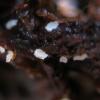
05-02-2026 15:07
Found on a fallen needle of Pinus halepensis, diam

05-02-2026 06:43
Stefan BlaserHello everybody, Any help on this one would be mu

18-08-2025 15:07
 Lothar Krieglsteiner
Lothar Krieglsteiner
.. 20.7.25, in subarctic habital. The liverwort i

02-02-2026 21:46
Margot en Geert VullingsOn a barkless poplar branch, we found hairy discs

02-02-2026 14:55
 Andgelo Mombert
Andgelo Mombert
Bonjour,Sur thalle de Lobaria pulmonaria.Conidiome

02-02-2026 14:33
 Andgelo Mombert
Andgelo Mombert
Bonjour,Sur le thalle de Peltigera praetextata, ne

31-01-2026 10:22
 Michel Hairaud
Michel Hairaud
Bonjour, Cette hypocreale parasite en nombre les

02-02-2026 09:29
 Bernard CLESSE
Bernard CLESSE
Bonjour à toutes et tous,Pour cette récolte de 2
White peculiarity on mosses
Marja Pennanen,
27-08-2010 11:04
is spite of unstudied old specimen, I went and picked some more last evening.
On the bottom of a dry ditch was a twig with something on.
So I pulled it off and after noticing, that it was Bisporella, put it back.
Some mosses were ripped off and covered with white spots.
Having some ealier experience of happenings like this, I studied them and there grow something hairy:
Marja Pennanen,
27-08-2010 11:10
Marja Pennanen,
27-08-2010 11:20
Re:White peculiarity on mosses
But the hairs were tapering, sometimes septate and had some crumbs on them (resinous matter?), size about 75-120x3-4,
Spores were 8-10x2-2,5 and asci 45-70x5-6, IKI+.
Now I'm wondering, which genus do they represent.
Hyaloscypha may ne one possibility, but no species is like this and at least I've never met a species with this kind of hair behavior.
Alternatives? Marja
Addition: there were some end cells or something like that (short hairs?), some of whisc can be seen at the bottom of the photo.
Spores were 8-10x2-2,5 and asci 45-70x5-6, IKI+.
Now I'm wondering, which genus do they represent.
Hyaloscypha may ne one possibility, but no species is like this and at least I've never met a species with this kind of hair behavior.
Alternatives? Marja
Addition: there were some end cells or something like that (short hairs?), some of whisc can be seen at the bottom of the photo.
Hans-Otto Baral,
27-08-2010 11:30

Re:White peculiarity on mosses
Maybe Hyaloscypha leuconica?
Marja Pennanen,
27-08-2010 12:16
Re:White peculiarity on mosses
Hello Otto,
I naturally checked that possibility, because it was the only one, that came to my mind.
This has got too big asci for H. leuconica.
Besides the septas are rare with them. These could have 0-2 septas as far as I saw.
The resinous matter should dissolve in Meltzer (which I don't have).
But in Lugol it was stable.
So, let's seek for another option, or what? Marja
Maybe I'll still check that...
I naturally checked that possibility, because it was the only one, that came to my mind.
This has got too big asci for H. leuconica.
Besides the septas are rare with them. These could have 0-2 septas as far as I saw.
The resinous matter should dissolve in Meltzer (which I don't have).
But in Lugol it was stable.
So, let's seek for another option, or what? Marja
Maybe I'll still check that...
Hans-Otto Baral,
27-08-2010 12:31

Re:White peculiarity on mosses
Ascus length is not so different, I see on a photo by Enrique 36-57 x 6-7 (probably alive).
Zotto
Zotto
Marja Pennanen,
27-08-2010 13:47
Re:White peculiarity on mosses
Hello,
I think you may be right. I only use fresh specimen and Seppo must have had dried ones.
I didn't test again in Lugol, because there is nothing, where the resins could dissolve.
I tested lactophenol instead. Now hairs were clean, straight and about 60-120x4-6, 0-1 septate (I must have imagined the second septa).
I saw no trace of croziers as usually and the ascus bases were plain.
H. leucnica var leuconica maybe.
Hopefully I finally learn to know the tricks of this species ;)
It seems to grow anywhere...
Thankfully: Marja
I think you may be right. I only use fresh specimen and Seppo must have had dried ones.
I didn't test again in Lugol, because there is nothing, where the resins could dissolve.
I tested lactophenol instead. Now hairs were clean, straight and about 60-120x4-6, 0-1 septate (I must have imagined the second septa).
I saw no trace of croziers as usually and the ascus bases were plain.
H. leucnica var leuconica maybe.
Hopefully I finally learn to know the tricks of this species ;)
It seems to grow anywhere...
Thankfully: Marja




